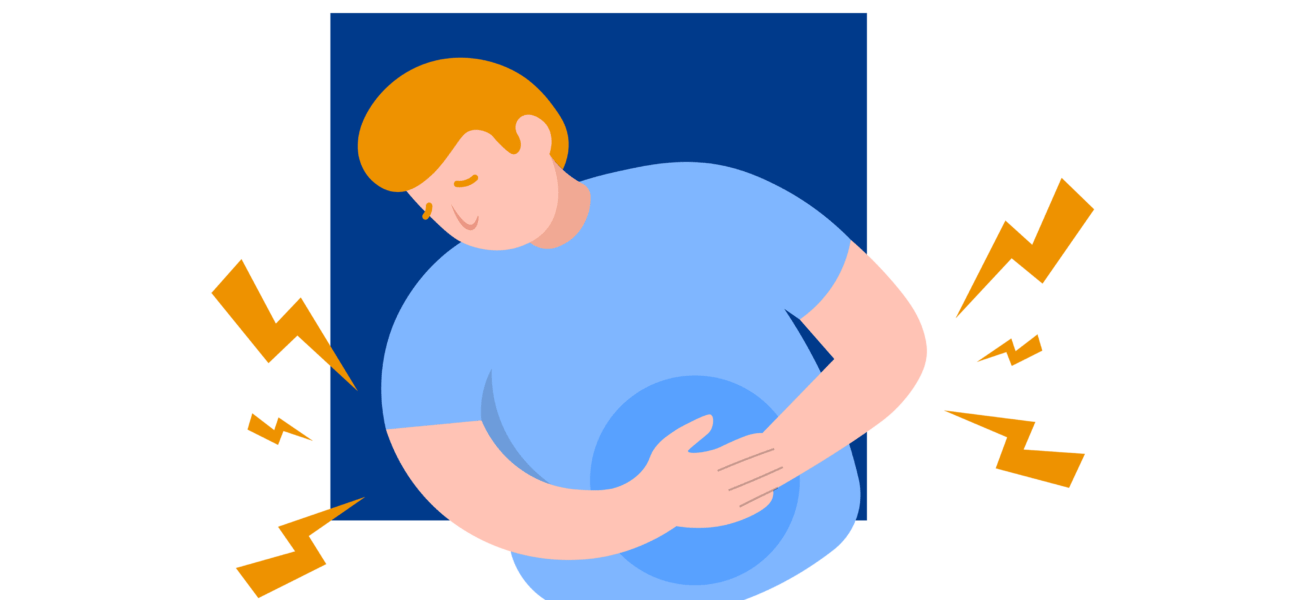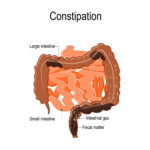Abdominal pain is a common symptom that affects many people at some point in their lives. It can range from mild to severe and have various causes and locations. In this blog post, we will explain what abdominal pain is, what are some of the possible causes, when to see a doctor, how it is diagnosed and treated, and how to prevent it.
What is abdominal pain?
Abdominal pain is defined as discomfort anywhere in the abdomen – between the ribs and the pelvis. We frequently refer to abdominal pain as “stomach pain” or “stomachache,” but pain in your abdomen could be caused by organs other than your stomach. Your abdomen is home to your:
• Stomach
• Liver
• Gallbladder
• Pancreas
• Spleen
• Kidneys
• Adrenal glands
• Small intestine
• Large intestine (colon)
• Appendix
• Bladder
• Uterus, ovaries, and fallopian tubes (in people assigned female at birth)
Abdominal pain can be classified into different types based on its characteristics:
• Localized pain: This type of pain is limited to one area of the abdomen. It may indicate a problem with a specific organ, such as stomach ulcers, gallstones, appendicitis, or ovarian cysts.
• Cramp-like pain: This type of pain may be associated with diarrhea, constipation, bloating, or gas. It may also be related to menstrual cramps, miscarriage, or ectopic pregnancy (when a fertilized egg implants outside the uterus) in people assigned female at birth. This pain usually comes and goes, and may improve on its own without treatment.
• Colicky pain: This type of pain is sudden and severe, and may feel like spasms or contractions. It may be caused by kidney stones, gallstones, or bowel obstruction.
What causes abdominal pain?
There are many possible causes of abdominal pain, depending on the location, duration, severity, and nature of the pain. Some of the common causes include:
• Infections: Viral, bacterial, or parasitic infections can affect the stomach and intestines, causing inflammation, diarrhea, nausea, vomiting, fever, and abdominal pain. Examples of infections that can cause abdominal pain are gastroenteritis (stomach flu), food poisoning, salmonella, shigella, E. coli, giardia, helicobacter pylori (H. pylori), diverticulitis (inflammation of pouches in the colon), and pelvic inflammatory disease (PID) (infection of the reproductive organs in people assigned female at birth).
• Inflammation: Inflammation is the body’s response to injury or irritation. It can cause swelling, redness, heat, and pain in the affected area. Inflammation can occur in any organ in the abdomen due to various reasons, such as infection, injury, autoimmune disease (when the immune system attacks healthy tissues), or allergic reaction. Some examples of inflammatory conditions that can cause abdominal pain are gastritis (inflammation of the stomach lining), pancreatitis (inflammation of the pancreas), hepatitis (inflammation of the liver), cholecystitis (inflammation of the gallbladder), colitis (inflammation of the colon), Crohn’s disease (inflammation of any part of the digestive tract), ulcerative colitis (inflammation of the inner lining of the colon), irritable bowel syndrome (IBS) (a disorder that affects how the colon works), and endometriosis (when tissue similar to the lining of the uterus grows outside the uterus).
• Obstruction: Obstruction is when something blocks or narrows a passage in the body. It can prevent or reduce the flow of fluids or solids through that passage. Obstruction can occur in any part of the digestive tract due to various reasons,
such as tumors (abnormal growths of cells), hernias (when an organ or tissue bulges through a weak spot in the abdominal wall), adhesions (scar tissue that forms after surgery or injury), intussusception (when a part of the intestine slides into another part), volvulus (when a part of the intestine twists around itself), or fecal impaction (when stool becomes hard and stuck in the rectum). Obstruction can cause severe abdominal pain, vomiting, constipation, bloating, and loss of appetite.
• Abnormal growths: Abnormal growths are masses of cells that form in or on an organ or tissue. They are classified as either benign (noncancerous) or malignant (cancerous). Abnormal growths can cause abdominal pain by pressing on nearby structures, causing inflammation, bleeding, or obstruction. Some examples of abnormal growths that can cause abdominal pain are polyps (small growths that form on the inner lining of the colon or stomach), cysts (fluid-filled sacs that form on or in an organ or tissue), fibroids (noncancerous tumors that grow in the uterus), ovarian cancer, colon cancer, stomach cancer, pancreatic cancer, and liver cancer.
When to see a doctor for abdominal pain?
Abdominal pain is usually not a sign of a serious problem and may go away on its own or with home remedies. However, some cases of abdominal pain may require medical attention, especially if the pain is:
• Severe or persistent
• Accompanied by fever, chills, sweating, or jaundice (yellowing of the skin and eyes)
• Accompanied by nausea, vomiting, diarrhea, or blood in the stool
• Symptoms include chest discomfort, shortness of breath, disorientation, or fainting.
• Accompanied by weight loss, loss of appetite, or difficulty swallowing
• Related to an injury or trauma to the abdomen
• Occurring during pregnancy or after recent surgery If you have any of these symptoms, you should see a doctor right once. Your doctor will ask you about your medical history, symptoms, and any medications or supplements you take. Your doctor will also examine your abdomen and may order some tests to find out the cause of your pain. Some of the tests that may be done are:
• Blood tests: These tests can check for signs of infection, inflammation, anemia (low red blood cell count), liver function, kidney function, and electrolyte levels.
• Urine tests: These tests can check for signs of infection, kidney stones, diabetes, or pregnancy.
• Stool tests: These tests can check for signs of infection, parasites, blood, or inflammation in the digestive tract.
• X-rays: These images can show the shape and size of your organs and any abnormalities such as tumors, stones, or foreign objects.
• Ultrasound: This test uses sound waves to create images of your organs and tissues. It can show the presence of cysts, tumors, stones, inflammation, or fluid in the abdomen.
• CT scan: This test uses X-rays and a computer to create detailed images of your organs and tissues. It can show more details than an X-ray and can help diagnose problems such as appendicitis,
diverticulitis, bowel obstruction, or cancer.
• MRI scan: This test uses a magnetic field and radio waves to create detailed images of your organs and tissues. It can show more details than a CT scan and can help diagnose problems such as endometriosis,
Crohn’s disease, ulcerative colitis, or cancer.
• Endoscopy: This test involves inserting a thin tube with a camera and a light at the end through your mouth or anus into your digestive tract. It can allow your doctor to see the inside of your esophagus,
stomach, small intestine, or colon and take samples of tissue for biopsy (examination under a microscope).
• Colonoscopy: This test is a type of endoscopy that involves inserting a thin tube with a camera and a light at the end through your anus into your colon. It can allow your doctor to see the inside of your colon and take samples of tissue for biopsy.
• Laparoscopy: This test involves making small incisions in your abdomen and inserting a thin tube with a camera and a light at the end through one of them. It can allow your doctor to see the inside of your abdomen and perform surgery if needed.
How is abdominal pain treated?
The treatment for abdominal pain depends on the cause and severity of the pain. Some of the possible treatments are:
• Medications: Your doctor may prescribe medications to treat the underlying cause of your pain or to relieve your symptoms. Some examples are antibiotics (to treat infections), antacids (to neutralize stomach acid), H2 blockers or proton pump inhibitors (to reduce stomach acid production), antispasmodics (to relax the muscles in the digestive tract), anti-inflammatory drugs (to reduce inflammation), analgesics (to relieve pain), laxatives (to treat constipation), antidiarrheals (to treat diarrhea), or hormonal contraceptives (to treat menstrual cramps or endometriosis).
• Surgery: Your doctor may recommend surgery to remove or repair the source of your painif there is a problem with the source of your pain, such as appendicitis, gallstones, hernia, or bowel obstruction. Surgery may involve removing the affected organ or tissue, repairing a defect or injury, or creating a bypass or stoma (an opening in the abdomen to allow waste to exit the body).
• Diet changes: Your doctor may advise you to modify your diet to avoid or limit foods and drinks that may trigger or worsen your abdominal pain. Some examples are:
• Alcohol
• Caffeine
• Carbonated beverages
• Fatty or greasy foods
• Spicy foods
• Tomatoes and oranges are high in acidity.
• Foods that cause gas, such as beans, cabbage, broccoli, and onions
• If you are lactose sensitive, avoid dairy products.
• Gluten-containing foods, if you have celiac disease or gluten sensitivity
Your doctor may also recommend eating smaller and more frequent meals, chewing your food well, drinking enough fluids, and avoiding eating late at night or lying down after eating.
• Psychological therapy: Your doctor may suggest psychological therapy if your abdominal pain is related to stress, anxiety, depression, or other emotional factors. Psychological therapy can help you cope with your emotions, identify and change negative thoughts and behaviors, and learn relaxation techniques. Some types of psychological therapy that may be helpful for abdominal pain are:
• Cognitive-behavioral therapy (CBT), which helps you change your thoughts and actions that affect your feelings and physical symptoms.
• Hypnotherapy, which uses hypnosis to induce a state of deep relaxation and suggest positive changes to your subconscious mind.
• Biofeedback, which uses sensors to monitor your body’s functions and teach you how to control them with your mind.
How to prevent abdominal pain?
You may not be able to prevent all cases of abdominal pain, but you can take some steps to reduce your risk of developing it or having recurrent episodes. Some of the preventive measures are:
• Practicing good hygiene: You can prevent infections that cause abdominal pain by washing your hands frequently with soap and water, especially before eating or preparing food, after using the bathroom or changing diapers, and after touching animals or their waste. You should also avoid sharing utensils, cups, or food with others who are sick or have symptoms of infection. You should also cook your food thoroughly, store it properly, and avoid eating raw or undercooked meat, eggs, seafood, or unpasteurized dairy products.
• Managing stress: You can reduce stress-related abdominal pain by finding healthy ways to cope with stress, such as exercising regularly, meditating, doing yoga, listening to music, reading a book, Spending time with friends and family, or getting professional assistance if necessary.
• Quitting smoking: You can lower your risk of developing ulcers, gastritis,
GERD, and stomach cancer by quitting smoking or avoiding exposure to secondhand smoke. Smoking can damage the lining of your stomach and esophagus and increase the production of stomach acid. Smoking can also weaken the lower esophageal sphincter (LES), which is a muscle that prevents stomach acid from flowing back into the esophagus.
• Taking medications as directed: You can prevent medication-induced abdominal pain by following your doctor’s instructions on how and when to take your medications. You should also inform your doctor about any other medications or supplements you are taking to avoid potential interactions or side effects. You should avoid taking NSAIDs (such as aspirin, ibuprofen, naproxen) for long periods of time or in high doses unless prescribed by your doctor. NSAIDs can irritate the lining of your stomach and intestines and increase the risk of bleeding ulcers.
• Seeking regular check-ups: You can prevent serious complications from undiagnosed or untreated conditions that cause abdominal pain by seeing your doctor regularly for routine check-ups and screenings. Your doctor can monitor your health status and perform tests to detect any problems early and treat them accordingly.
Conclusion
Abdominal pain is a common symptom that can have many possible causes and treatments. It is important to pay attention to the characteristics of your pain and any other symptoms you may have. If your pain is severe, persistent, or accompanied by other worrisome signs, you should see your doctor as soon as possible. Your doctor can diagnose the cause of your pain and prescribe the appropriate treatment for you. You can also prevent some cases of abdominal pain by following some simple tips on hygiene, diet, stress management, smoking cessation, medication use, and regular check-ups.



